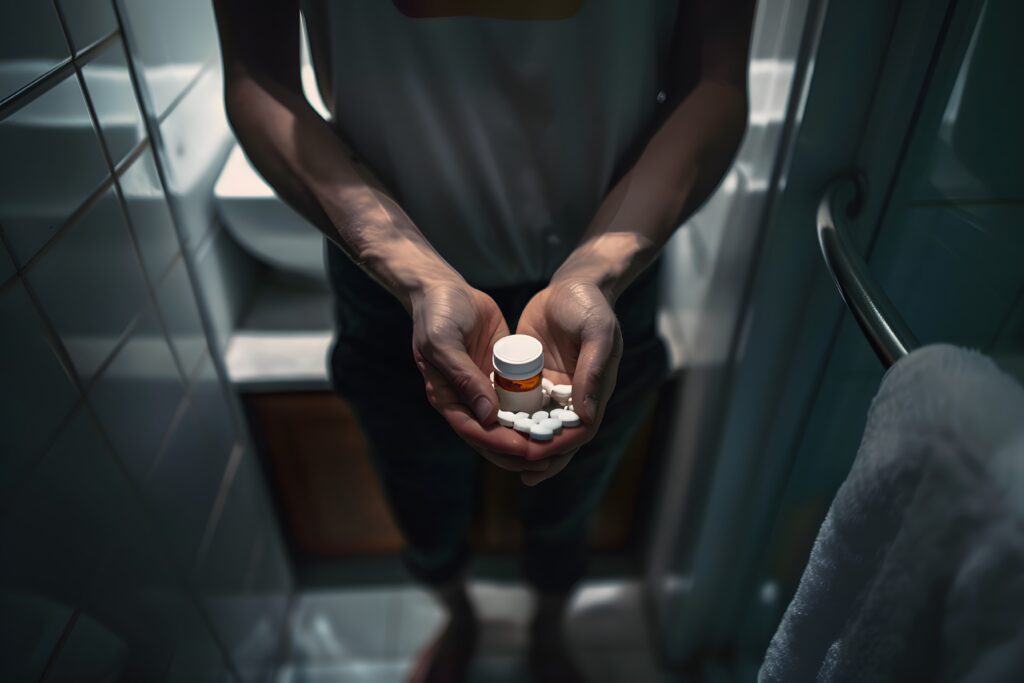Prescription drug addiction continues to be one of the most pressing public health challenges in the United States, and Tennessee is no exception.
From powerful opioids to benzodiazepines and stimulants, prescription medications that are meant to heal are often misused, leading to dependence, addiction, and devastating consequences for individuals and families.
In Tennessee, the rates of prescription drug abuse remain alarmingly high. The state has long been a hotspot in the opioid epidemic, with prescription painkillers like oxycodone and hydrocodone contributing significantly to overdose deaths.
At the same time, misuse of stimulants like Adderall and sedatives like Xanax is also on the rise, particularly among teens, college students, and working professionals trying to manage stress or performance demands.
At Tulip Hill Recovery, we understand the complex and deeply personal nature of prescription drug addiction.
Located in Murfreesboro, we offer compassionate, individualized prescription drug addiction treatment in Tennessee. We serve communities across Middle Tennessee, including Nashville, Franklin, Brentwood, and beyond.
Our prescription drug addiction rehab center provides a full continuum of care, from detox to outpatient services, using a trauma-informed approach tailored to each person’s unique recovery journey.
Whether you or a loved one is struggling with painkillers, anxiety medications, or ADHD prescriptions, healing starts here—with nonjudgmental support, expert care, and a pathway to long-term sobriety.

t Tulip Hill Recovery, we understand the complexities of prescription drug addiction and its profound impact on individuals and families. Our dedicated team in Murfreesboro, TN, offers compassionate, evidence-based treatment tailored to each person’s unique journey toward recovery.
We blend medical expertise with holistic approaches to address the physical, emotional, and spiritual aspects of addiction, ensuring a comprehensive and personalized path to lasting sobriety. Embrace hope and healing with Tulip Hill’s specialized prescription drug addiction treatment services.
At Tulip Hill Recovery, we recognize that prescription drug addiction is a complex and challenging issue that affects many individuals and families in Tennessee. Prescription drugs, while medically useful, can lead to dependence and addiction if misused. Commonly abused prescription drugs include opioids, sedatives, stimulants, and anti-anxiety medications.
What Is Prescription Drug Addiction?
Prescription drug addiction occurs when someone becomes physically or psychologically dependent on medications that were originally intended to treat a legitimate health condition.
While these medications—such as painkillers, anti-anxiety drugs, stimulants, or sleep aids—can be effective when used as they’re prescribed, they also carry a high potential for misuse and addiction.
Prescription drug misuse includes taking a medication in a way that the prescribing doctor does not intend. This might involve taking higher doses, using someone else’s prescription, combining medications with alcohol or other substances, or taking a drug simply to experience its effects.
Over time, misuse can lead to tolerance, dependence, and full-blown addiction.
The line between proper use and addiction isn’t always obvious. A person might start with a valid prescription after surgery or for anxiety, only to find themselves relying on the drug to feel “normal.”
As tolerance builds, they may take more than prescribed or begin seeking the drug from multiple sources. This pattern can lead to severe consequences—physically, emotionally, and socially.
The effects of prescription drug addiction go beyond the body. It often leads to mood swings, memory issues, relationship problems, declining work or school performance, and even legal trouble.
Many people struggling with addiction also experience co-occurring mental issues like depression or anxiety, which further complicate recovery.
At Tulip Hill Recovery, our specialized prescription drug treatment program addresses all these aspects, helping clients understand the roots of their addiction, rebuild their health, and regain control over their lives.
Commonly Abused Prescription Medications
Prescription medications are often trusted for their ability to manage pain, anxiety, sleep disorders, and attention-related conditions. When misused, many of these medications carry a high dependence and addiction risk, leading individuals to seek help from prescription drug rehab centers across Tennessee.
Below are some of the most commonly abused prescription drug categories we treat at Tulip Hill Recovery.
- Opioids: Opioids are prescribed to relieve pain, often after surgery or injury. Common examples include oxycodone, hydrocodone, morphine, and fentanyl. While effective for pain control, opioids are highly addictive. Prolonged use can quickly lead to tolerance, withdrawal symptoms, and physical dependence, often requiring comprehensive care at a prescription drug rehab.
- Benzodiazepines: Benzodiazepines like alprazolam (Xanax), lorazepam (Ativan), and diazepam (Valium) are used to treat anxiety, panic disorders, and insomnia. These medications work by calming the central nervous system, but over time, they can create both psychological and physical dependence. Withdrawal can be dangerous without proper medical support, making drug prescription rehab a critical step in recovery.
- Stimulants: Stimulants like Adderall (amphetamine/dextroamphetamine) and Ritalin (methylphenidate) are commonly prescribed for ADHD and narcolepsy. When misused—for example, taken without a prescription to enhance focus or energy—they can lead to addiction, sleep disturbances, and cardiovascular issues.
- Sedatives and Hypnotics: Drugs like zolpidem (Ambien) and eszopiclone (Lunesta) are prescribed to treat insomnia. While effective in the short term, these medications can be habit-forming. Misuse may result in dependence, rebound insomnia, and daytime drowsiness. Treatment at prescription drug rehab centers is often necessary for safe withdrawal and long-term recovery. At Tulip Hill Recovery, we address addiction to all of these medications through personalized, evidence-based care in a supportive environment.
Signs and Symptoms of Prescription Drug Addiction
Recognizing the potential signs of prescription drug addiction can be difficult, especially when the use of medications may have started under a doctor’s supervision.
However, as misuse progresses into dependence and addiction, a pattern of physical, emotional, and behavioral changes often emerges.
Knowing what to look for can help you or a loved one seek prescription drug treatment before the addiction becomes life-threatening.
Behavioral Signs
- Taking higher doses than prescribed or using medication more frequently
- “Doctor shopping” or visiting multiple physicians to get more prescriptions
- Using prescriptions intended for someone else
- Lying or becoming defensive when asked about medication use
- Neglecting responsibilities at work, school, or home
- Withdrawing from social activities or changing friend groups
- Stealing or borrowing medications from others
Emotional and Psychological Symptoms
- Mood swings, irritability, or aggression
- Anxiety or depression, especially between doses
- Increased secrecy or isolation
- Loss of interest in hobbies or personal goals
- Cravings for the drug and obsession with obtaining it
Physical Symptoms
- Tolerance: Needing more of the drug to feel the same effect
- Withdrawal symptoms when not using (shaking, sweating, nausea, insomnia)
- Drowsiness, slurred speech, or slowed reflexes (with sedatives)
- Weight changes or appetite loss
- Sleep disturbances
These warning signs often intensify as the addiction deepens, increasing the risk of overdose, accidents, and long-term health consequences.
Early intervention through prescription rehab can significantly improve outcomes.
At Tulip Hill Recovery, we provide comprehensive assessments and personalized treatment plans to address not just the addiction but the underlying emotional and psychological issues as well.
If you recognize these symptoms in yourself or a loved one, it may be time to reach out for support. Prescription drug addiction is treatable, and healing starts with the first step.
Safe & Medically Supervised Prescription Drug Detox
When someone becomes physically dependent on medications like opioids, benzodiazepines, or stimulants, the first step toward recovery is often prescription drug detox. Detox is the process of clearing the drug from the body while managing withdrawal symptoms in a safe and controlled environment.
At Tulip Hill Recovery, we offer medically supervised detox services designed to support both physical stabilization and emotional well-being during this critical stage.
Detoxing from prescription drugs can be physically and psychologically intense. Withdrawal symptoms depend on the substance and the severity of use:
- Opioids (e.g., oxycodone, hydrocodone) can cause nausea, muscle pain, sweating, anxiety, and intense cravings.
- Benzodiazepines (e.g., Xanax, Ativan) may trigger dangerous withdrawal symptoms like seizures, panic attacks, and insomnia if stopped abruptly.
- Stimulants (e.g., Adderall, Ritalin) often result in fatigue, depression, mood swings, and sleep disturbances.
Because of these risks, attempting to detox at home is never recommended. Prescription drug rehabilitation centers, like Tulip Hill Recovery, provide 24/7 medical oversight, emotional support, and medication-assisted treatment (MAT) when needed to minimize discomfort and complications.
During detox at Tulip Hill, clients receive:
- A full medical assessment before beginning the process
- Round-the-clock clinical monitoring to manage symptoms
- Medication support (if appropriate) to ease withdrawal
- Trauma-informed care from experienced professionals
- A personalized treatment plan that continues into PHP, IOP, or outpatient care
We treat each client with dignity and compassion, ensuring that detox is not only medically effective but also emotionally supportive.
For many, detox is the beginning of true healing.
Once the body is stabilized, individuals are better able to engage in therapy and take the next steps in their recovery journey.
Learn more about our prescription drug detox services here.
If you or a loved one is struggling with prescription drug dependence, Tulip Hill Recovery’s detox program offers a safe, supportive environment to begin recovery. Our prescription drug rehabilitation process is comprehensive, evidence-based, and tailored to help you reclaim your life.
How We Treat Prescription Drug Addiction at Tulip Hill Recovery
At Tulip Hill Recovery, we believe that effective prescription drug addiction treatment goes far beyond stopping drug use—it’s about healing the whole person.
Our comprehensive approach is rooted in science, compassion, and a deep understanding of how addiction affects each individual differently.
Consequently, we create individualized treatment plans tailored to your specific needs, background, and recovery goals.
Whether you’re recovering from opioids, benzodiazepines, stimulants, or a combination of substances, our team is here to support you through every step of your journey.
Our Full Continuum of Prescription Drug Rehab in Tennessee
At Tulip Hill Recovery, we offer a full continuum of care to support each client through every phase of their healing journey.
From structured daytime therapy to flexible outpatient options, our prescription drug addiction rehab programs are designed to meet you where you are—and help you progress toward long-term sobriety at a pace that works for you.
Partial Hospitalization Program (PHP)
Our PHP (Partial Hospitalization Program) is the most intensive level of outpatient care we offer.
Clients participate in structured, full-day treatment—typically 5 to 6 days a week—with services including individual therapy, group counseling, trauma-informed care, and medication management.
PHP is ideal for those transitioning from detox or residential care who still require daily support without a 24-hour stay.
Intensive Outpatient Program (IOP)
Our IOP in Tennessee is a step down from PHP, providing more flexibility while still offering robust clinical care.
Clients attend therapy sessions 3 to 5 days a week, typically for 3 hours per day.
IOP is a great fit for individuals who are ready to begin reintegrating into work, school, or family life while continuing to receive support for prescription drug addiction.
Outpatient Care & Aftercare Planning
Once clients complete PHP or IOP, they may transition to standard outpatient services or a personalized aftercare plan.
This plan may include individual therapy, alumni groups, sober living arrangements, and referrals to local support resources.
Aftercare is critical to relapse prevention and maintaining long-term recovery.
Seamless Transitions Between Levels of Care
At Tulip Hill Recovery, clients move between programs based on clinical progress, not a set timeline. We assess your needs weekly and adjust your treatment plan to ensure you’re receiving the right level of care at the right time.
This flexible approach allows us to provide the most effective support for every stage of recovery.
If you’re looking for one of the best prescription drug rehab centers in Tennessee that offers comprehensive PHP and IOP services, Tulip Hill Recovery is here to help.

Why Choose Tulip Hill Recovery for Prescription Drug Addiction Treatment in TN
When it comes to finding the right prescription drug addiction rehab center, experience, compassion, and personalized care make all the difference.
Tulip Hill Recovery is a family-run treatment center in Murfreesboro, Tennessee, serving communities in Franklin, Nashville, Hopkinsville, and beyond.
Our intimate size and low client-to-staff ratio allow us to provide deeply individualized attention and support.
We specialize in dual diagnosis treatment, addressing not just the addiction itself, but the underlying mental issues, like anxiety, trauma, depression, or PTSD, that often fuel it.
This integrated approach promotes long-term recovery and reduces the risk of relapse.
Our Tennessee prescription rehab services are built around evidence-based practices like CBT, DBT, EMDR, and Medication-Assisted Treatment (MAT), combined with holistic modalities such as yoga, mindfulness, and art therapy.
Clients don’t just detox—they learn how to rebuild their lives from the inside out.
We meet each person where they are—whether they’re seeking prescription drug detox, enrolling in our PHP or IOP programs, or transitioning to outpatient care.
At every level, we provide a warm, trauma-informed environment where healing can happen.
If you’re looking for trusted addiction treatment in TN for yourself or a loved one, Tulip Hill Recovery offers the expertise, compassion, and structure needed to support sustainable recovery from prescription drug addiction.
Get Help Now – Contact Tulip Hill Recovery
If you or someone you love is struggling with prescription drug misuse, don’t wait.
Tulip Hill Recovery offers compassionate, personalized prescription drug addiction treatment in TN, with programs available in Murfreesboro, Nashville, and Franklin.
We’re here to answer your questions, verify your insurance, and help you begin a treatment plan tailored to your needs.
Get help for prescription drug addiction—our team is ready to support you every step of the way. It’s never too late to start prescription rehab and take back control of your life.
FAQs About Prescription Drug Rehab in Tennessee
1. What’s the first step in getting help for prescription drug addiction?
The first step is to contact us for a confidential assessment. At Tulip Hill Recovery, we evaluate your needs and help you determine the right level of care—whether detox, PHP, IOP, or outpatient treatment. Our team is here to walk you through every step.
2. Is detox required for prescription medications?
In many cases, yes. Medications like opioids, benzodiazepines, and stimulants can cause physical dependence and uncomfortable or even dangerous withdrawal symptoms. A medically supervised prescription drug detox is often the safest and most effective way to begin recovery.
3. How long does prescription drug rehab take?
The length of treatment depends on several factors, including the severity of addiction and co-occurring mental health conditions. Programs at Tulip Hill typically range from 30 to 90 days, with longer-term aftercare and outpatient support available to promote lasting recovery.
4. Does insurance cover prescription drug addiction treatment in TN?
Yes, many insurance plans—including BCBS, Aetna, Anthem, and others—cover some or all of the costs associated with prescription drug addiction treatment in Tennessee. We offer free insurance verification to help you understand your coverage.
5. What makes Tulip Hill different from other prescription drug rehab centers?
Tulip Hill Recovery is a family-run facility with a low client-to-staff ratio, allowing for deeply personalized care. We provide evidence-based treatment, trauma-informed support, and holistic therapies.
Our dual diagnosis approach ensures that both addiction and mental health concerns are addressed together.
6. Can I live at home during treatment?
Yes. Both our PHP and IOP programs are non-residential. Depending on your situation, you can live at home or in a sober living residence while attending treatment.
7. What types of prescription drug addictions do you treat?
We treat addiction to opioids (like oxycodone or fentanyl), benzodiazepines (like Xanax), stimulants (like Adderall), and other prescription sedatives. Each treatment plan is tailored to the individual’s needs and specific substance use history.







 Call Us
Call Us
 877-845-8192
877-845-8192